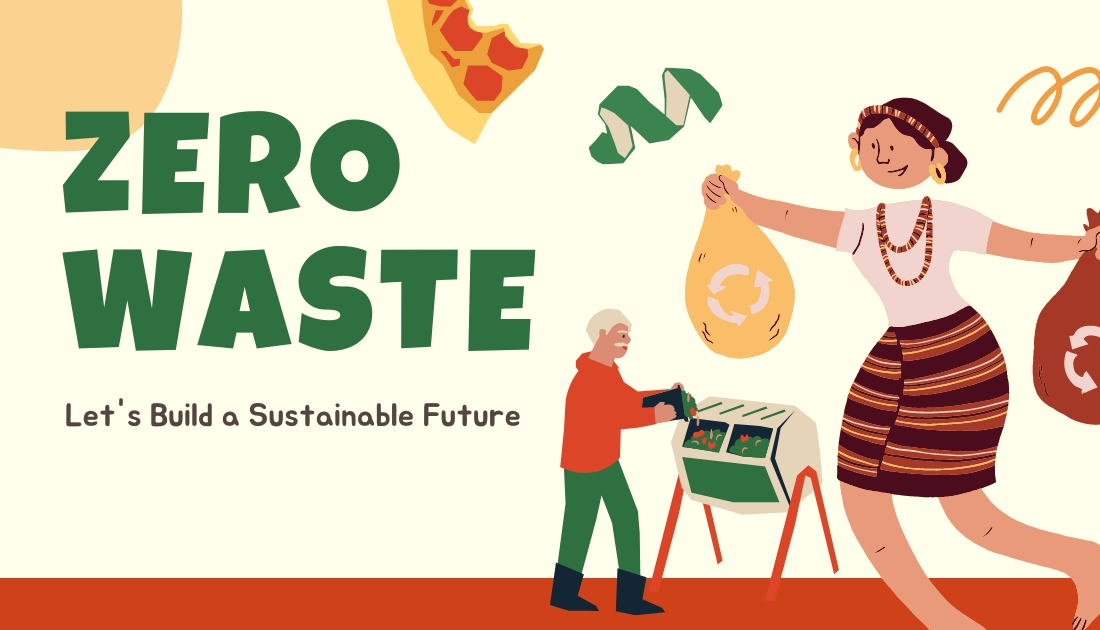What exactly is zero waste and how does it challenge us to rethink the way we think about and use our planet’s resources? In this article, we’ll explore exactly what zero waste is and how it addresses climate change while simultaneously reducing the impact of our wasteful culture.
What is actual Zero Waste?
Conservation of all resources through responsible production, use, reuse and recovery of goods, packaging and materials without combustion and without the release of pollutants into land, water or air that harm the environment or people.
Contrary to its name, zero waste doesn’t necessarily mean producing absolutely no waste. Rather, it focuses on diverting waste from landfills and incinerators by following the 5 R’s hierarchy: Refuse, Reduce, Reuse, Recycle, and Rot (compost)
The 5 R’s of Zero Waste:
- Refuse: The first step in the zero waste journey is to refuse what we don’t need. This includes single-use plastics, unnecessary packaging, junk mail, and other disposable items. By saying no to these products, we can significantly reduce the amount of waste we generate.
- Reduce: Next, we aim to minimize our consumption and simplify our lives. This involves making conscious choices about what we buy, opting for high-quality, durable products over disposable ones, and resisting the urge to indulge in unnecessary purchases.
- Reuse: Reusing items is a cornerstone of the zero waste lifestyle. Instead of throwing things away after a single use, we find creative ways to give them new life. This can involve repairing, repurposing, or upcycling items to extend their lifespan and reduce waste.
- Recycle: Recycling is essential, but it should be seen as a last resort rather than the ultimate solution. While recycling helps divert waste from landfills and conserve resources, it’s important to remember that not all materials can be recycled, and the process itself requires energy and resources.

- Rot (Compost): Organic waste makes up a significant portion of our garbage, but it doesn’t have to end up in landfills. Composting is a natural way to turn food scraps and yard waste into nutrient-rich soil, which can be used to nourish gardens and landscapes.
Benefits of Zero Waste Living:
Embracing a zero waste lifestyle offers a myriad of benefits, both for individuals and the planet:
- Environmental Impact: By reducing the amount of waste we produce, we conserve natural resources, reduce pollution, and minimize the carbon footprint associated with waste disposal.
- Financial Savings: Adopting a zero waste mindset can lead to significant cost savings over time. By buying less, choosing reusable alternatives, and avoiding disposable products, we can stretch our budgets further.
- Simplified Living: Zero waste living encourages us to declutter our lives and focus on what truly matters. By prioritizing experiences over possessions, we can cultivate a greater sense of fulfillment and satisfaction.
- Community Building: The zero waste movement is built on principles of collaboration, sharing, and mutual support. By connecting with like-minded individuals and communities, we can learn from each other, share resources, and amplify our impact.
Challenges and Solutions:
While the zero waste lifestyle offers countless benefits, it’s not without its challenges. Transitioning to a zero waste lifestyle requires dedication, patience, and a willingness to challenge conventional norms. However, with the right mindset and support system, anyone can embark on this journey towards sustainability.
Some common challenges include:
- Accessibility: Depending on where you live, access to package-free groceries, bulk stores, and recycling facilities may be limited. However, creative solutions such as community composting programs, farmers’ markets, and online zero waste shops can help bridge the gap.
- Social Pressures: Living a zero waste lifestyle often means swimming against the tide of consumerism and convenience culture. It’s essential to stay true to your values and prioritize what aligns with your beliefs, even if it means facing criticism or skepticism from others.
- Personal Habits: Breaking old habits and forming new ones takes time and effort. Start small, set achievable goals, and celebrate your progress along the way. Remember that every small change makes a difference.
Zero waste living isn’t a goal to aim for; it’s a journey of discovery, environmental responsibility, and conscious consumption. By adopting the principles of reducing, reuse, recycling, and refuse we can all play a part in shaping a more resilient and sustainable future for future generations. So let’s take a step back and imagine a future where waste isn’t an inevitable part of life, a thing of the past — a world where every little thing we do helps create a better tomorrow.
